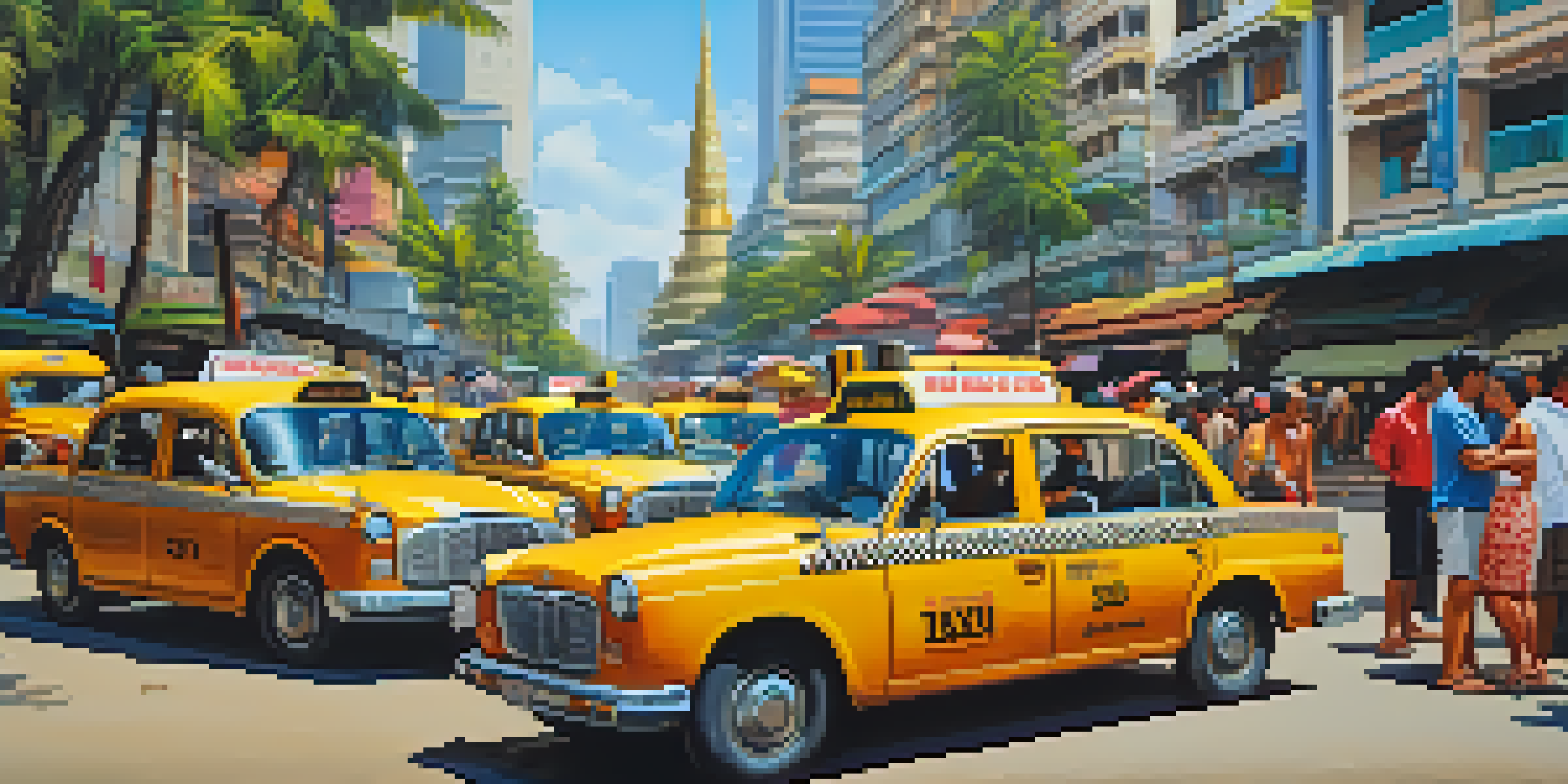Navigating Thai Transportation: Key Vocabulary

Understanding Basic Thai Transportation Terms
When navigating Thailand, it's essential to know some basic transportation vocabulary. Words like 'รถ' (rot) meaning 'car,' and 'มอเตอร์ไซค์' (motor-sai) for 'motorbike' will be incredibly useful. These terms form the foundation of communicating about transportation options, whether you're hailing a taxi or asking for directions.
Traveling – it leaves you speechless, then turns you into a storyteller.
Additionally, knowing phrases like 'สถานีรถไฟ' (sathani rot fai) for 'train station' and 'ป้ายรถเมล์' (pai rot mae) for 'bus stop' can help you find your way around the city. These terms are not only helpful but also make you feel more connected to the local culture. It’s like learning a secret code that unlocks the joys of exploring Thailand!
Finally, familiarizing yourself with these terms will help you navigate public transport systems more effectively. Having a few key words in your back pocket can transform a potentially overwhelming experience into a more manageable and enjoyable one.
Essential Vocabulary for Taxis and Ride-Hailing
Taxis are a popular mode of transportation in Thailand, and knowing how to communicate with drivers is crucial. Start with the word 'แท็กซี่' (taek-sii), which means 'taxi.' You might also want to learn how to say 'ไป' (bpai), meaning 'to go,' which is essential when telling the driver your destination.

If you're using ride-hailing apps like Grab, familiarize yourself with terms such as 'รถรับจ้าง' (rot rap jang), meaning 'ride service.' This will help you understand the difference between regular taxis and ride-hailing options. It’s similar to knowing the difference between a regular cab and an Uber back home.
Essential Thai Transportation Terms
Knowing basic Thai transportation vocabulary helps you navigate cities and connect with local culture.
Lastly, don't forget to ask about the fare. The phrase 'เท่าไหร่' (tao rai) means 'how much?' Knowing this can prevent any surprises at the end of your journey. With these phrases at your disposal, you’ll feel much more confident getting around Thai cities.
Navigating Public Transport: Buses and Trains
Public transport in Thailand offers an affordable way to explore the country. To get started, you'll need to know the word for 'bus,' which is 'รถเมล์' (rot mae). This is a crucial term to help you identify the right transport options in bustling cities like Bangkok.
To travel is to discover that everyone is wrong about other countries.
For train journeys, knowing 'รถไฟ' (rot fai) for 'train' is essential. When looking for schedules or asking for information, phrases like 'ตารางเวลา' (tataang way-la) meaning 'timetable' will be incredibly useful. It's like having the right tools to navigate a complex map; the more you know, the easier it gets!
Additionally, learning how to ask about stops is vital. The phrase 'ลงที่ไหน' (long thee nai) means 'where do I get off?' This can help you avoid missing your destination. With these vocabulary words, you'll be able to travel confidently through Thailand’s public transport systems.
Key Vocabulary for Renting Vehicles
If you’re considering renting a vehicle in Thailand, knowing the right vocabulary can ease the process. Start with 'รถเช่า' (rot chao), which means 'rental car.' Understanding this term can help you communicate your needs at rental agencies.
You might also want to learn about 'จักรยาน' (jakrayaan) for 'bicycle' and 'มอเตอร์ไซค์' (motor-sai) for 'motorbike.' Many tourists opt for these options to explore the scenic views at their own pace. It’s a bit like choosing between a family car or a sports bike for a weekend adventure.
Communication Tips for Taxis
Familiarizing yourself with key phrases for taxis and ride-hailing services ensures smooth journeys.
Lastly, don’t forget to inquire about insurance. The term 'ประกันภัย' (bprakan pai) means 'insurance,' and asking about it will ensure you’re covered during your travels. With this vocabulary in hand, you'll be well-equipped to rent and enjoy your means of transportation.
Understanding Directions: Asking for Help
Getting lost is part of the adventure when traveling, but knowing how to ask for directions can save you time. Start with the phrase 'ไปไหน' (bpai nai), meaning 'where to go?' This is a straightforward way to ask locals for help without feeling too overwhelmed.
Also, learn how to identify key locations like 'ถนน' (thanon) for 'street' and 'แยก' (yaek) for 'intersection.' Knowing these words allows you to ask for specific directions rather than general advice. It’s much like having a GPS; the more precise you are, the better your guidance will be.
Lastly, remember to practice polite phrases like 'ขอโทษ' (khor thot) which means 'excuse me.' This will help you build rapport with locals, making them more willing to assist you. With these phrases, asking for directions becomes less daunting and more engaging.
Safety Vocabulary for Travelers
Staying safe while traveling is a top priority, and having the right vocabulary can help. Knowing the word 'ปลอดภัย' (bplaawt pai) means 'safe,' allowing you to ask about safety measures when using various forms of transport.
In case of emergencies, familiarize yourself with terms like 'ช่วย' (chuay), which means 'help.' This word can be a lifesaver in urgent situations, much like knowing how to call 911 back home. It’s empowering to know that you can communicate your needs when it matters most.
Cultural Etiquette Enhances Travel
Understanding transportation etiquette and polite phrases fosters better interactions with locals.
Moreover, understanding 'ตำรวจ' (tamruat) for 'police' can be essential if you ever need to report something. This vocabulary ensures that you can seek help and navigate any issues that arise during your travels. With these terms, you can travel with peace of mind.
Cultural Insights: Transportation Etiquette
Understanding transportation etiquette in Thailand can enhance your travel experience. For instance, it's customary to greet drivers with a polite 'สวัสดี' (sawasdee), which means 'hello.' This simple greeting can go a long way in fostering friendly interactions.
Additionally, when using public transport, it’s important to be aware of your surroundings and keep noise levels down. The phrase 'เงียบหน่อย' (ngiap noi) means 'be quiet,' which can help you navigate social norms when sharing a space with others. It’s like being part of a respectful community.

Lastly, tipping is appreciated but not mandatory. A polite 'ขอบคุณ' (khob khun) meaning 'thank you' can express your gratitude to drivers or service staff. By understanding these cultural nuances, you can engage more deeply with the local community during your travels.
Final Thoughts: Embrace the Journey
Navigating transportation in Thailand can be a delightful adventure with the right vocabulary. From hailing a taxi to using public transport, each term you learn opens up new possibilities for exploration. Think of it like learning the ropes to a new game; the more you understand, the more fun you’ll have.
As you familiarize yourself with these essential phrases, you’ll find it easier to communicate and connect with locals. This not only enhances your travel experience but also fosters a sense of belonging. It’s akin to being part of a global family, united by the joy of travel.
So, take a deep breath, embrace the journey, and remember that every new word learned is a step towards deeper engagement with the vibrant culture of Thailand. With these vocabulary tools, you’re set to create unforgettable memories in this beautiful country.